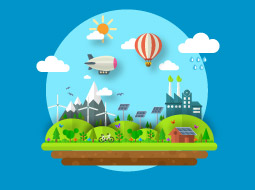Online courses directory (20)
How agriculture feeds the world: a study of farms, farmers and the challenges they face.
Explore how food intersects with public health and the environment as it moves from field to plate.
Practicing veterinarian prepares you to work in a veterinary office or hospital.
Practicing veterinarian teaches you to manage the entire canine breeding cycle, from assessing the health of parents to puppy care.
Learn the practical skills you'll need to be a valuable veterinary assistant or educated pet owner.
There are several hundred thousand Brownfield sites across the country. The large number of sites, combined with how a majority of these properties are located in urban and historically underserved communities, dictate that redevelopment of these sites stands to be a common theme in urban planning for the foreseeable future. Students form a grounded understanding of the Brownfield lifecycle: how and why they were created, their potential role in community revitalization, and the general processes governing their redevelopment. Using case studies and guest speakers from the public, private and non-profit sectors, students develop and hone skills to effectively address the problems posed by these inactive sites.
Learn about urban water services, focusing on basic drinking water and wastewater treatment technologies
Sustainable development is a type of economic growth pattern where the use of resources meets the needs of the human population while conserving the environment at the same time. Sustainable development means resources are used in such a way that both current and future human needs can be met. This free online Diploma in Sustainable Development reviews a diverse range of topics including what exactly sustainability is and what systems of practice are most commonly used, and in particular, examines the importance of sustainable development in counteracting global climate change. Two very important issues in sustainable development are energy sources that meet current and future demands, and water conservation. The course reviews both non-renewable and renewable energy sources and examines how current and future demands for energy can be met for a growing global population. Water is a vital resource for all countries and the course reviews how supply and demand for water by industry, agriculture and people can be met. This course will be of great interest to all professionals interested in international development, and in the sustainability and environmental sectors who would like to learn more about global sustainable development. It will also be of interest to the general learner who is interested in how current and future demands for the earth's resources by a growing human population can be met.<br />
Explores connections between what we eat and who we are through cross-cultural study of how personal identities and social groups are formed via food production, preparation, and consumption. Organized around critical discussion of what makes "good" food good (healthy, authentic, ethical, etc.). Uses anthropological and literary classics as well as recent writing and films on the politics of food and agriculture.
In this class, food serves as both the subject and the object of historical analysis. As a subject, food has been transformed over the last 100 years, largely as a result of ever more elaborate scientific and technological innovations. From a need to preserve surplus foods for leaner times grew an elaborate array of techniques – drying, freezing, canning, salting, etc – that changed not only what people ate, but how far they could/had to travel, the space in which they lived, their relations with neighbors and relatives, and most of all, their place in the economic order of things. The role of capitalism in supporting and extending food preservation and development was fundamental. As an object, food offers us a way into cultural, political, economic, and techno-scientific history. Long ignored by historians of science and technology, food offers a rich source for exploring, e.g., the creation and maintenance of mass-production techniques, industrial farming initiatives, the politics of consumption, vertical integration of business firms, globalization, changing race and gender identities, labor movements, and so forth. How is food different in these contexts, from other sorts of industrial goods? What does the trip from farm to table tell us about American culture and history?
Eating well and understanding the nuances of food has become a complicated and often confusing experience. Virtually every day brings news about some “miracle food” that we should be consuming or some "poison" we should be avoiding. One day it's tomatoes to prevent cancer, then flaxseed against heart disease or soybeans for menopause. At the same time, we are warned about trans fats, genetically modified foods, aspartame and MSG. Dietary supplements are often touted as the key to health or a factor in morbidity. According to some, dairy products are indispensable while others urge us to avoid them. The same goes for meat, wheat and soy; the list goes on.
This course will shed light on the molecules that constitute our macro and micronutrients and will attempt to clarify a number of the food issues using the most relevant, up-to-date science available. Other topics to be presented will include the diet-cancer relationship, the link between diet and cardiovascular disease, food-borne illnesses, food additives and weight control.
For the first time in history, the global demand for freshwater is overtaking its supply in many parts of the world. The U.N. predicts that by 2025, more than half of the countries in the world will be experiencing water stress or outright shortages. Lack of water can cause disease, food shortages, starvation, migrations, political conflict, and even lead to war. Models of cooperation, both historic and contemporary, show the way forward. The first half of the course details the multiple facets of the water crisis. Topics include water systems, water transfers, dams, pollution, climate change, scarcity, water conflict/cooperation, food security, and agriculture. The second half of the course describes innovative solutions: Adaptive technologies and adaptation through policy, planning, management, economic tools, and finally, human behaviors required to preserve this precious and imperiled resource. Several field trips to water/wastewater/biosolids reuse and water-energy sites will help us to better comprehend both local and international challenges and solutions.
Erfolgreiche und effiziente Landwirtschaft benötigt ein gutes Management. Um wirtschaftlich entscheiden zu können, brauchen Agraringenieure und Landwirte ausgeprägtes Fachwissen. Das vermittelt der Kurs anhand realer Betriebsbeispiele. Sprache: DE-RU
This course will cover the agricultural and urban water quality issues in Florida, their bases, land and nutrient management strategies, and the science and policy behind the best management practices (BMPs). Students will learn to evaluate BMP research and analyze its role in determining practices and policies that protect water quality.
This course encompasses the study of eating as it affects the health and well-being of every human. Topics include taste preferences, food aversions, the regulation of hunger and satiety, food as comfort and friendship, eating as social ritual, and social norms of blame for food problems. The politics of food discusses issues such as sustainable agriculture, organic farming, genetically modified foods, nutrition policy, and the influence of food and agriculture industries. Also examined are problems such as malnutrition, eating disorders, and the global obesity epidemic; the impact of food advertising aimed at children; poverty and food; and how each individual's eating is affected by the modern environment.
This course is an overview of engineering approaches to protecting water quality with an emphasis on fundamental principals. Theory and conceptual design of systems for treating municipal wastewater and drinking water are discussed, as well as reactor theory, process kinetics, and models. Physical, chemical, and biological processes are presented, including sedimentation, filtration, biological treatment, disinfection, and sludge processing. Finally, there is discussion of engineered and natural processes for wastewater treatment.
The course material emphasizes mathematical models for predicting distribution and fate of effluents discharged into lakes, reservoirs, rivers, estuaries, and oceans. It also focuses on formulation and structure of models as well as analytical and simple numerical solution techniques. Also discussed are the role of element cycles, such as oxygen, nitrogen, and phosphorus, as water quality indicators; offshore outfalls and diffusion; salinity intrusion in estuaries; and thermal stratification, eutrophication, and sedimentation processes in lakes and reservoirs. This course is a core requirement for the Environmental MEng program.
This subject is concerned with quantitative methods for analyzing large-scale water resource problems. Topics covered include the design and management of facilities for river basin development, flood control, water supply, groundwater remediation, and other activities related to water resources. Simulation models and optimization methods are often used to support analyses of water resource problems. In this subject we will be constructing simulation models with the MATLAB® programming language and solving numerical optimization problems with the GAMS optimization package.
"What people do with food is an act that reveals how they construe the world."
- Marcella Hazan, The Classic Italian Cookbook
If you are what you eat, what are you? Food is at once the stuff of life and a potent symbol; it binds us to the earth, to our families, and to our cultures. In this class, we explore many of the fascinating issues that surround food as both material fact and personal and cultural symbol. We read essays by Toni Morrison, Michael Pollan, Wendell Berry, and others on such topics as family meals, eating as an "agricultural act" (Berry), slow food, and food's ability to awaken us to "our own powers of enjoyment" (M. F. K. Fisher). We will also read Pollan's most recent book, In Defense of Food, and discuss the issues it raises as well as its rhetorical strategies. Assigned essays will grow out of memories and the texts we read, and may include personal narrative as well as essays that depend on research. Revision of essays and workshop review of writing in progress are an important part of the class. Each student will make one oral presentation in this class.
Успешное и эффективное ведение сельского хозяйства требует хорошего менеджмента. Для того, чтобы уметь экономически правильно принимать решения, инженеры-агрономы и фермеры должны обладать отличительными знаниями. На DE и RU языках.
Trusted paper writing service WriteMyPaper.Today will write the papers of any difficulty.






















